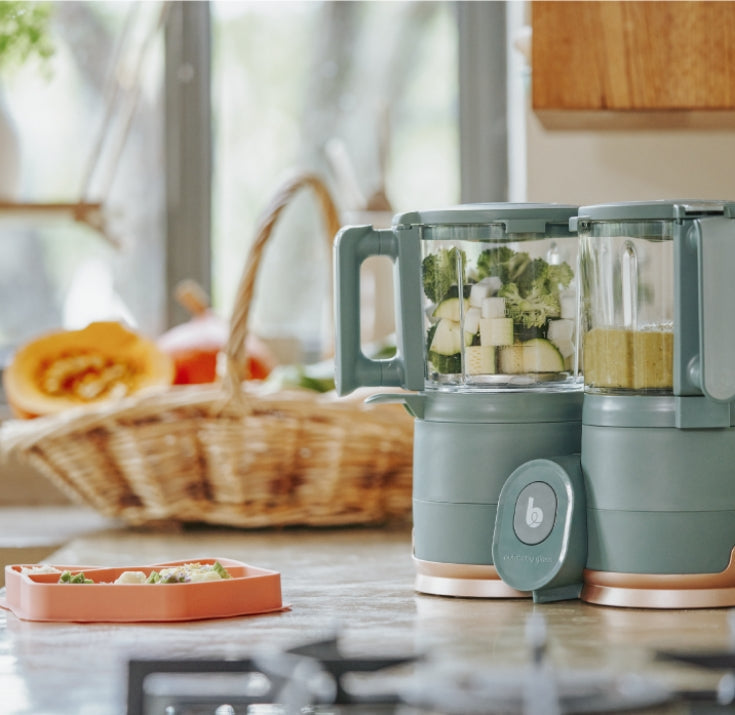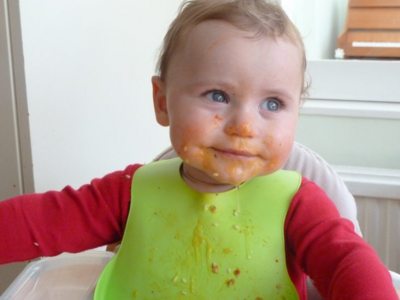By Julia Wolman, Registered Nutritionist
This is my son Leo at 8 months. Whilst weaning, my obsessive-compulsive tendencies made me mindful of the clean-up process that lay ahead, on the other hand, the nutritionist in me knew how important it was not to stress about the mess.
All too often I witness babies reaching out to touch a spoon or bowl of food to see and feel what’s in it, whilst the parent ever so quickly retracts it out of their reach. I understand, I have a fear of mess too, and I know it really is so much easier to just steer little hands clear of anything semi-solid. However, when it comes to weaning mess really is best.
5 reasons why it’s important for babies to explore (or squish, prod, smear!) their food at mealtimes:
1) It's fun
From experience, watching babies exploring their food in an unpressurised environment is usually accompanied by beaming smiles on their faces. And when they are happy and relaxed at mealtimes, they are more likely to enjoy eating and develop a positive relationship with food in the long run. As tempting as it might be to step in with a baby wipe, try to take a step back instead, and take pleasure in watching them enjoy themselves.
2) Learning through sensory play
Any early years’ practitioner will confirm that ‘a play opportunity is a learning opportunity’. This theory can also be applied to mealtimes. When a baby squashes a chunk of potato, s/he is learning how solid foods can, under pressure, turn to mash. When they rub their fingers in yoghurt, they are learning how runny textures feel. When they throw food on the floor they are learning about the forces of gravity!
Research from the University of Iowa suggests that playing with food may improve a child’s learning abilities, specifically in relation to developing early vocabulary. The study, published in the journal Developmental Science in December 2013, looked at the mealtime behaviour of 72 toddlers. It found those who were allowed to explore foods, for example, through touching, poking or throwing them, were more likely to name them correctly.
3) Increasing familiarity
Babies need to feel comfortable with and trust that new foods are ‘safe’ before they will put them in their mouths. So it follows that if they don’t know how a food smells, or feels, they may be reluctant to taste it. All too often parents may interpret this response as a baby not liking a certain food, when really, they just don’t know enough about it to want to try.
4) Fine motor skills development
Around nine months, babies usually develop the ability to use a pincer grip, whereby they can pick things up using their thumb and forefinger. Before this age they tend to grab using their whole hand. Allowing babies the freedom to explore smaller pieces of food with their fingers will help to develop their pincer grip - try blueberries, peas, sweetcorn, raisins or rice (NB. always supervise your child and never leave them alone during eating).
5) Hand-eye coordination
Whether using spoons or self-feeding, when babies do it themselves they are learning how to get food into their mouths. And while most of it may go anywhere but their mouth at the beginning, with practice they’ll quickly work it out!
Examples of foods your baby will love to explore:
- Cooked broccoli or cauliflower florets
- Potato or sweet potato wedges
- Banana chunks
- Porridge
- Scrambled egg or omelette
- Spaghetti bolognaise
- Mini sandwiches
- Yoghurt
- Rice pudding
- Fishcakes
So, if butternut squash gets in their hair, behind their ears and under their chin, it is ok. It will all come off in the bath! Put those baby wipes down, avoid wiping messy fingers until the end, and remember that messy meals are healthy meals.






Leave a comment
This site is protected by hCaptcha and the hCaptcha Privacy Policy and Terms of Service apply.